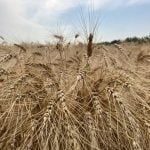Glacier FarmMedia | MarketsFarm — As price movement in soybeans on the Chicago Board of Trade continued to be a tussle between dry conditions in Brazil versus pressure from the United States harvest, Sean Lusk, vice-president of Walsh Commercial Hedging in Chicago, suggested not to pay much attention to any trade action China might soon take against U.S. soybeans.
There have been concerns in the soybean market that China could undertake some kind of punitive action against the U.S. for slapping a 100 per cent tariff on imports of Chinese electric vehicles. Those levies are set to take effect on Sept. 27.
Read Also

U.S. livestock: Feeder cattle hit contract highs on tight supply
Chicago | Reuters – All Chicago Mercantile Exchange feeder cattle futures and most live cattle futures hit contract highs on…
“They’re buying most of their beans from South America anyways,” Lusk stated and expressed his disappointment in Trump-era trade agreements with China.
“Our trade deals are that [China] continues to book our [soybeans] and cancel later. That’s never changed under the Phase One or Phase Two trade deals under Trump,” he added, stressing caution when it comes to China.
“Never listen to what they say, only pay attention to what they do,” Lusk continued. “They can say ‘we’re going to do this or we’re going to do that,’ but if there’s a weather issue down in South America, they will in no doubt come to buy from us.”
Lusk said China imports a very large portion of their soybeans from Brazil and Argentina because those countries have greatly expanded their production over the last 10 to 15 years, especially Brazil.
“It has driven more competition to drive prices lower,” he said, noting food security is China’s main goal.
“So they will gladly dismiss whatever tariffs on EV’s to [assure] their own food security,” Lusk added.
He said an important thing to do is to carefully watch the export inspection reports issued by the U.S. Department of Agriculture as to see how much soybeans are shipped to China.
China recently started an anti-dumping investigation into Canadian canola, following Canada’s move to hike tariffs on Chinese EV’s. Although canola initially fell sharply, the oilseed made significant recovery during the week of Sept. 16.
















